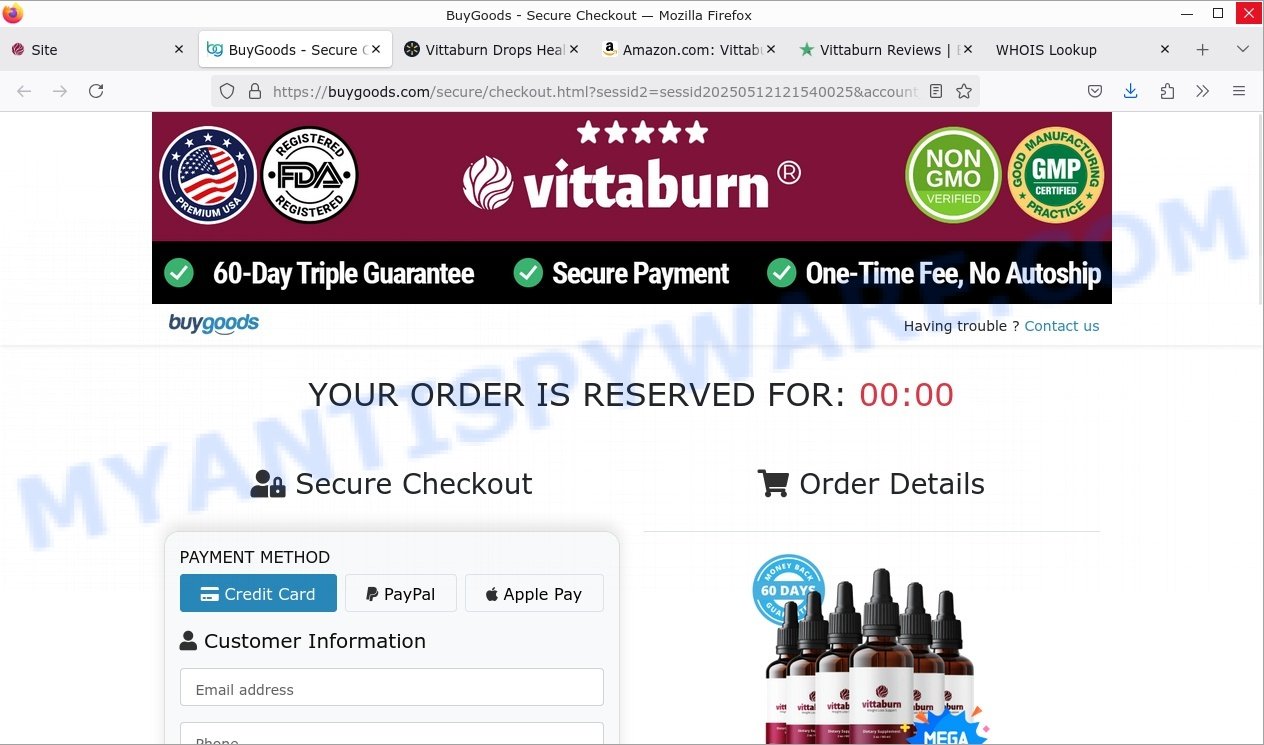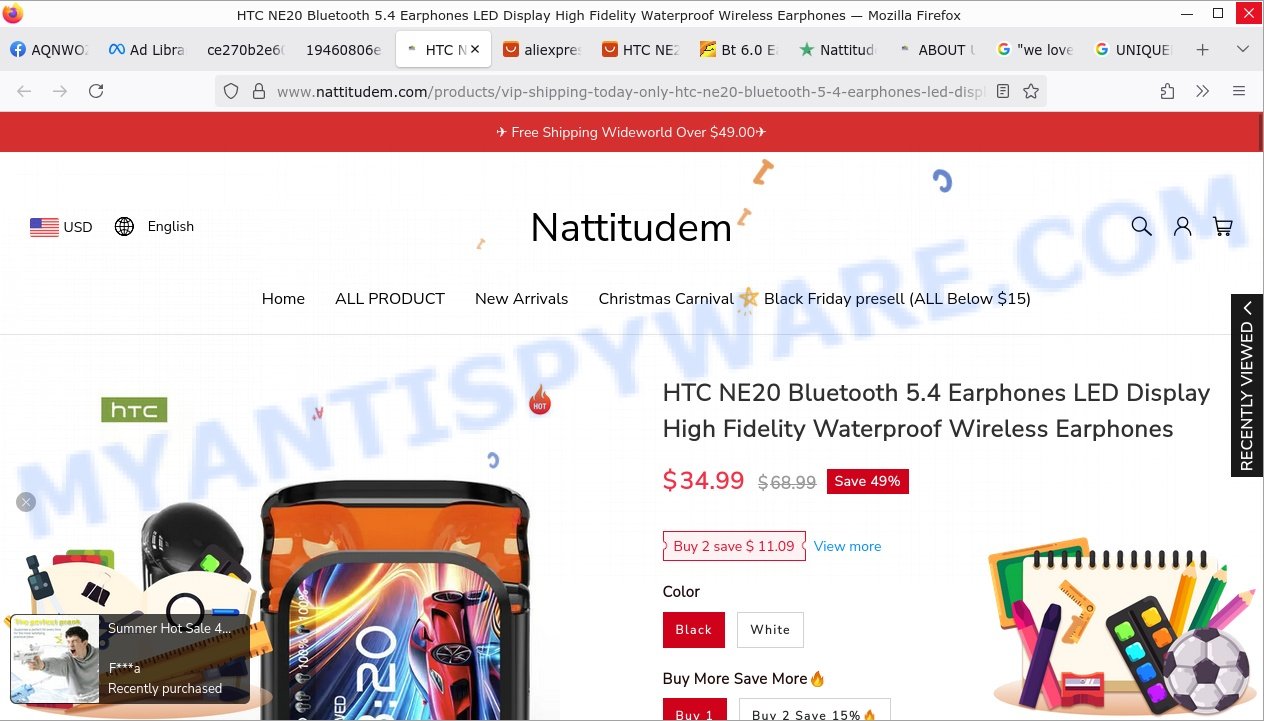Scammers are circulating a deceptive “McAfee – Built-in Antivirus Has Detected A Threat” pop-up that tricks users into believing their computer is infected with viruses or actively hacked. This fake alert is a classic scare tactic designed to push victims into purchasing unnecessary or even harmful software through affiliate links. While it references McAfee, a legitimate antivirus company, the pop-up itself has no affiliation with the brand and often leads to misleading or unsafe sites.
Typical scam pop-ups include urgent messages such as:
- “Attention! Built-in antivirus has detected a threat! Click here for a free scan”
- “Hidden threat monitoring mode activated. Someone may have unauthorized access to your PC”
- “Your computer is infected with (7) critical viruses! Immediate action required”
- “Your antivirus protection has expired. Renew now to remove viruses”
These messages frequently try to alarm you by displaying fake IP addresses, claiming multiple successful logins from foreign countries, or listing high-risk malware supposedly detected on your system. The intent is to create panic and pressure you into clicking calls-to-action that lead to dubious offers for antivirus software or security subscriptions.
Be aware that these pop-ups are not generated by McAfee or any trustworthy security provider. Genuine antivirus software does not use browser pop-ups to deliver warnings or sales pitches. Instead, stick to official apps and verified websites when checking your device’s security.
If you encounter a warning like this:
- Do not click any links or call any provided phone numbers.
- Close the browser tab or window immediately.
- Run scans with your legitimate antivirus program, or consult a trusted IT professional.
- Never provide payment or personal details in response to unsolicited security alerts.
Remember, cybercriminals exploit fear around computer infections to steal your money or personal information. Stay informed and cautious to avoid falling victim to scams masquerading as urgent antivirus warnings.
💡 Heads-up: Similar Scams Are Everywhere. Built-in Antivirus Has Detected A Threat is not unique. It is one of many fake supplements, gadgets, and other schemes we expose in our Fact Checks section. All of them aim to grab your personal data or money. The people behind these scams run slick websites, spread bogus promo codes, and even pose as trusted brands or experts. Below are a few recent scams that follow the same playbook as Built-in Antivirus Has Detected A Threat: Memory Lift, PayTube, AquaSculpt, My Mobile Machine, PetsBoro Bunny Pal.
Table of Contents
🚨 Is the “McAfee Built-in Antivirus Has Detected A Threat” Pop-Up a Scam?
The “McAfee – Built-in Antivirus Has Detected A Threat” pop-up is a common affiliate scam designed to scare users into believing their computer is infected with multiple critical viruses. Scammers exploit the trusted McAfee brand to trick users into purchasing unnecessary or fake antivirus subscriptions through deceptive alerts and aggressive sales tactics.
Scam popups:
McAfee
Attention! Built-in antivirus has detected a threat!
You are seeing this message because something is wrong with your PC. Click the button to perform a free scan of your PCMcAfee
Hidden threat monitoring mode
You are on the screen of the hidden threats check.
Here you can check the suspicious activity on your PC.
What to do?
1. Make sure that there is only 1 cursor on your PC screen now mouse and it is yours.
2. If you see not only your cursor, then someone has hidden access to your PC.
Choose the appropriate response option.McAfee
Hidden threat monitoring mode
What to do?
1. Move your mouse cursor over the black square.
2. If you notice unusual cursor behaviour inside the black square, it means that someone is currently watching your PC or is remotely connected to it.
Choose the appropriate response option.McAfee
Hidden threat monitoring mode
Someone is currently viewing your data, passwords, and files
Based on your answers, we have identified a real threat to your PC.
Windows has detected several unauthorized connections to your PC
IP: 172.154.15.4 Time: Active now Device: Windows, Chrome Country: India Status: Successful login
IP: 154.170.488.45 Time: Active 14 hours ago Device: Windows, EDGE Country: India Status: Successful login
IP: 142.454.47.47 Time: Active 22 hours ago Device: Windows, Chrome Country: India Status: Successful login
To quickly remove the virus, you need to scan your PCMcAfee
Your computer infected with critical (7) viruses!
Warning
Your banking details, passwords, photos, and insurance numbers are in immediate danger right now! Immediate action is required!
Do not ignore this message and do not close the website! Your data may be stolen, which could lead to financial losses.
Please start your McAfee Total Protection to eliminate all threatsMcAfee
Warning! Your antivirus protection is not active!
Viruses found
Ransomware (High Risk) Win32/CryptoLocker.X9Zr…
Trojan.Gen.2 (High Risk) Win32/Melissa2023.Xi92
Trojan.Gen.2 (High Risk) Win32/Zeus.2023…
Russian Trojan (Ultra-High Risk) Win32/Mydoom.2023…
Warm (High Risk) Win32/Conficker.2jf9…
Russian Trojan (Ultra-High Risk) Win32/Pshtrm.Slmn…
Virus (Normal Risk) Win32/Trojan.H028hj…
Your Antivirus Protection Has Expired
7 viruses have been detected on your computer that steal your data and transmit it to malicious actors. After obtaining this data, a hacker or criminal can take out a loan in your name, use your insurance, clone your bank cards, use your email or social media accounts to solicit money from your acquaintances under your name, or blackmail you with your private photos or videos.
Warning
Even if you currently have McAfee antivirus installed, its license has expired, and in order to remove the viruses, you need to renew it! If you’re not ready to renew the license now, unfortunately, the antivirus won’t be able to remove the detected viruses – which means you are in danger! If you don’t have an antivirus installed, please install one to protect yourself. Click the button below to get a license and remove the viruses.
55% Discount for Renew!
Key Red Flags:
- 🚩 Fake Security Alerts: The pop-ups use alarming language warning of ransomware, trojans, and unauthorized remote access attempts, aiming to create panic about your PC’s security.
- 🌐 Misleading Affiliate Redirects: Although these scams may redirect to McAfee’s official site through affiliate links, the primary goal is to earn commissions from unnecessary license renewals prompted by scare tactics.
- ⚠️ Unrealistic Threat Scenarios: Messages like multiple successful logins from foreign IP addresses and hidden cursor monitoring are fabricated to induce fear and urgency without technical basis.
- 🎯 High-Pressure Sales Techniques: The alerts push instant action, boasting limited-time discounts (e.g., “55% Discount for Renew!”) and warnings that your license has expired or your PC is vulnerable without immediate renewal.
- 🛑 Suspicious Behavior & Pop-up Persistence: These warning pop-ups frequently appear as persistent browser alerts that cannot be easily closed, pressuring users to interact with them.
- ❌ False Claims About Antivirus Status: The pop-ups often claim your current antivirus protection is inactive or expired, even if you already have legitimate McAfee software installed and up to date.
In summary, the McAfee “Built-in Antivirus Has Detected A Threat” pop-up scam preys on fear and confusion by mimicking real antivirus warnings to push unnecessary purchases through affiliate commissions. While McAfee is a legitimate antivirus brand, these scam pop-ups are not official McAfee communications and do not indicate real infections. It is strongly advised to avoid clicking links or providing payment information from such pop-ups. Instead, verify your antivirus status directly through official software or McAfee’s official website, and consult trusted IT professionals if you suspect a real infection.
🕵️♂️ How the “McAfee Built-in Antivirus Has Detected A Threat” Pop-Up Scam Operates
The scammers behind the “McAfee Built-in Antivirus Has Detected A Threat” pop-up scam leverage alarming fake warnings designed to scare users into taking immediate action. These pop-ups appear suddenly on users’ browsers or devices, mimicking legitimate McAfee branding and language to create a sense of urgency and credibility.
The scam typically begins with intrusive ads or redirects that display messages claiming your PC is infected with multiple viruses, spyware, or ransomware. Warnings such as “Immediate danger to your banking details” or “Unauthorized connections detected” are used to frighten users. The pop-ups ask users to click on buttons promising free scans or virus removal, falsely claiming these are official McAfee tools.
When users click, they are either redirected to deceptive websites or prompted to download software or license keys, which are either fake or malware themselves. The scamsters exploit affiliate marketing programs, generating illegitimate commissions by encouraging unnecessary or fraudulent purchases of security software licenses.
The websites often feature fake threat lists naming viruses like “Win32/CryptoLocker.X9Zr” or “Win32/Mydoom.2023” alongside counterfeit renewal discounts such as “55% Off” to pressure victims into buying or renewing a license immediately. Scammers also use fake system dialogs showing suspicious IP addresses or remote logins to further panic users.
A major red flag is that these warnings don’t come from actual McAfee software but appear in browsers or pop-ups, often persisting even after closing them or restarting the system. Attempts to call support or use provided contact info lead to fake customer service lines aiming to extract payment information.
In summary, the McAfee built-in antivirus pop-up scam uses fear tactics, fake virus alerts, and impersonation of trusted antivirus brands to trick users into purchasing bogus security products or services. Victims are often left with wasted money, potential malware infections, and compromised personal information. Always verify antivirus alerts directly through your installed security software and avoid clicking suspicious pop-ups or links.
Summary Table
| Name | McAfee “Built-in Antivirus Has Detected A Threat” Pop-Up Scam |
| Type | Fake antivirus pop-up scam, affiliate scam |
| Target | Computer users, especially those worried about viruses |
| Scam Method | Fake pop-up warnings pretending to be from McAfee antivirus; linked to affiliate marketing sites |
| Goal | To scare users into buying fake or unnecessary antivirus software or services |
| Indicators | Multiple scary virus warnings, fake IP details, urgent calls to renew antivirus license |
| Advice | Do not click pop-ups; close them and use trusted antivirus software to scan your PC |
😱 What to Do If Scammed
If you find yourself ensnared by the Built-in Antivirus Has Detected A Threat Scam, immediate action is crucial. Here’s what you should consider doing:
🛑 Stop Further Transactions
The first step is to halt any additional transactions that might be in process. Contact your bank or credit card provider and inform them that you’ve fallen victim to a scam. They can help by blocking the card or reversing any unauthorized transactions.
📞 Report the Fraud
File a report with your local police and provide all the available evidence, such as screenshots, emails, and website URLs. Additionally, report the scam to online portals like the Better Business Bureau (BBB) at www.bbb.org or the Federal Trade Commission (FTC) at reportfraud.ftc.gov. If you’re in another country, reach out to your national consumer protection agency.
💻 Take Screenshots
Before the scam website gets taken down or changes, make sure to capture screenshots of your transactions and communications. These can serve as evidence if you decide to pursue legal action.
⚖️ Consult Legal Advice
Speak to a legal advisor about your situation. While pursuing legal action may be time-consuming and costly, it could be a possible avenue for recovering your lost money.
📢 Share Your Experience
Use social media platforms to share your experience and warn others about the scam. Your story could prevent someone else from falling victim to the same or similar scams.
Conclusion
The McAfee “Built-in Antivirus Has Detected A Threat” pop-up is a scam that preys on your fears by presenting fake security alerts to trick you into clicking malicious links or purchasing unnecessary subscriptions. This scam operates by falsely claiming that your computer is infected with viruses or that unauthorized users are accessing your data, using alarming messages and fabricated details to create a sense of urgency.
Rather than providing legitimate protection, these pop-ups seek to redirect you to affiliate sites or fraudulent pages that mimic the McAfee brand. They use deceptive tactics such as fake virus names, bogus IP address logs, and urgent warnings about expired licenses to manipulate victims into revealing personal information or making payments.
Bottom Line: Do not trust unsolicited pop-up warnings about threats from McAfee unless you have verified them directly through your official McAfee application or website. Avoid clicking any links or buttons in these suspicious alerts. Always keep your antivirus software updated through official channels and run scans using trusted software installed on your device. If you encounter such pop-ups, close the browser tab immediately and consider running a scan with your legitimate security software to ensure your system is safe. Remember, genuine antivirus programs do not generate alarming pop-ups urging immediate action via third-party websites. Stay vigilant and informed to protect yourself from these scams.

















